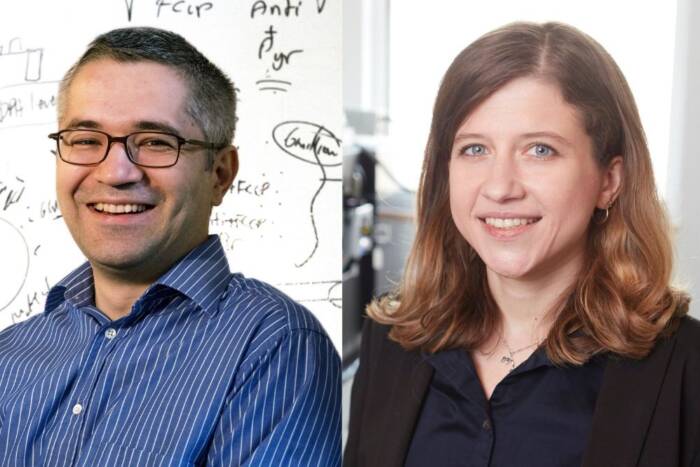A new institute devoted to research on global infectious disease is funded by a $75 million grant
The COVID crisis brought to light weaknesses in pandemic preparedness and gaps in health care, both here in the United States and around the world. Together with the Stavros Niarchos Foundation (SNF), the University is creating a new global institute to strengthen the response to future crises.
The SNF Institute for Global Infectious Disease Research, funded by a $75 million grant from the SNF, will build on the COVID research efforts underway by the university’s investigators, and will provide a framework for international scientific collaboration to foster research innovations and turn them into practical health benefits.
“The COVID pandemic has underscored the critical need for investment in infectious disease research to enable development of broadly effective and durable vaccines and therapeutics,” says Richard P. Lifton, the university’s president. “The SNF Institute for Global Infectious Disease Research will accelerate innovation and provide scientific education and public awareness to the global community.”
The institute will be led by Nobel laureate Charles M. Rice, Rockefeller’s Maurice R. and Corinne P. Greenberg Professor in Virology and former chair of New York State’s COVID-19 Clinical Advisory Task Force. It will be co-directed by immunologist Michel Nussenzweig, the Zanvil A. Cohn and Ralph M. Steinman professor, and Barry Coller, David Rockefeller professor and physician-in-chief of The Rockefeller University Hospital.
“Emerging pathogens will keep coming in the future, and we need coordinated, intensive research in order to be prepared,” Rice says. “The new institute will provide us with the means to encourage global collaborations, and a capability to support everything from basic infectious disease research to clinical development.”
“To rise to the health challenges we face today, our approach must be unified across disciplines and borders,” says SNF Co-President Andreas Dracopoulos. “The new institute will not only lay the scientific foundation for better prevention and treatment of infectious diseases but will also help to ensure that those treatments are made available globally and equitably.”
Prepared to act
As many public-health experts have noted, a lack of preparedness undermined responses to recent disease outbreaks like those of SARS-CoV-2 and monkeypox. But amplified investments in basic science could put us ahead of the curve in responding to future threats, for example by shortening the pipeline to developing new vaccines or therapies.
The new institute builds on Rockefeller’s long legacy of infectious-disease research in supporting intensive research on pathogens, including proven troublemakers as well as likely new suspects. Among other initiatives, it will support several studies launched in 2020 aimed at better understanding the biology of SARS-CoV-2 and developing interventions to prevent and treat infections, including work by Rockefeller scientists Michel Nussenzweig, Paul Bieniasz, Theodora Hatziioannou, and Charles Rice. Together with Pamela Björkman at the California Institute of Technology, this group characterized the immune response to natural infection and to vaccines and boosters, tracking the evolution of both the virus and our antibodies.
The institute will also support COVID research launched by geneticist Jean-Laurent Casanova at the outset of the pandemic. His effort to identify genetic differences that predispose some people to developing severe COVID-19 quickly evolved into a collaboration of extraordinary global scope, the COVID Human Genetic Effort, which currently involves more than 30 labs and more than 250 medical centers on six continents.
The new institute will also help advance research by labs that are not normally focused on infectious diseases or viral pathogens, but whose expertise has made significant contributions to the pandemic response. Among them were the labs of structural biologists Seth Darst and Elizabeth Campbell, and biochemist Tarun Kapoor, who determined the architecture of the replication machinery of SARS-CoV-2, a critical step for the design of novel treatments. Similarly, biochemist Thomas Tuschl has identified promising small molecules that inhibit enzymes essential for the life cycle of SARS-CoV-2.
The bridge between scientific discoveries and clinical application is supported by The Rockefeller University Hospital and the Center for Clinical and Translational Science, and their team of experts in conducting clinical trials, including biostatisticians, clinical research coordinators, and clinical research nurses. Physician-in-chief Barry Coller has put in place an infrastructure for recruiting and studying research volunteers, which was especially critical in the early weeks and months of the pandemic.
Broad scope
While SARS-CoV-2 and other coronaviruses are a major focus, the new institute will also support research on many other types of viruses posing health challenges. For instance, a universal flu vaccine is still out of reach, and there are no vaccines that protect against all four types of dengue, a virus threatening billions of people. There is also an urgent need for a vaccine against hepatitis C, a disease showing unanticipated increases in new infections globally. And drug-resistant bacteria pose a threat several orders of magnitude more serious than the current pandemic according to some experts.
Moreover, population density, climate change, and human activity encroaching on forests have led to an increased risk of first encounters with viruses that have long been lurking in nature. And once these viruses spill over into the human population, they may quickly spread to broad areas and hop over continents.
Yet researchers are hopeful that the technologies developed in response to COVID will cross over into other vaccine efforts, and that the momentum built over the past three years will energize work on other pathogens. The new SNF Institute for Global Infectious Disease Research will seek to galvanize and build on the progress made to date.
“We are a global community when it comes to infectious diseases,” Rice says. “We have to be willing to tackle global challenges that are not necessarily of immediate concern in the US, and to encourage research collaboration around the world.”


